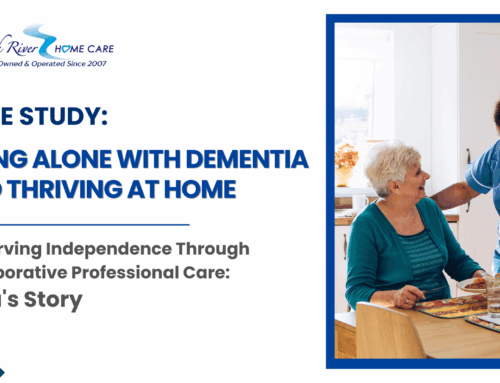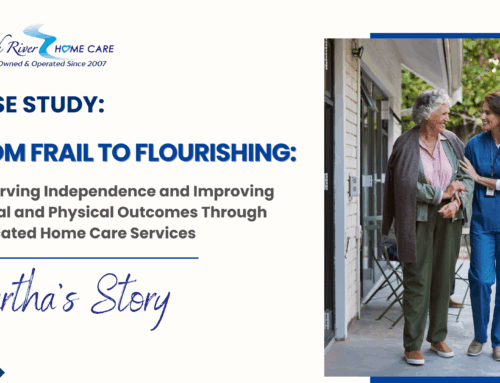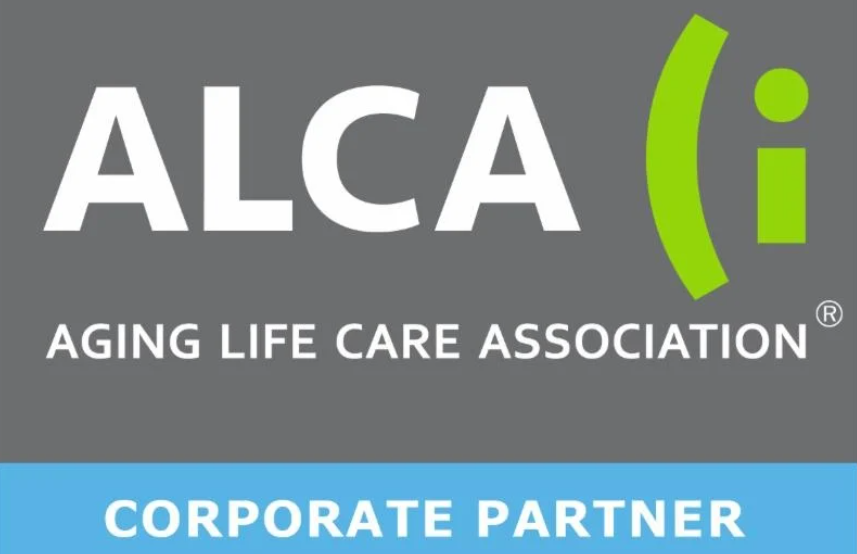Dementia is a progressive disease and is often described in three stages: early dementia, mid-stage dementia, and late-stage dementia. But as memory care professionals, we’ve observed that each significant stage is divided into mini-stages correlating to specific home care needs.
Recognizing the various stages of dementia helps spouses and family caregivers understand which home care services are needed now and how to plan for the future. While Alzheimer’s is the most common form of dementia, the following seven stages of progression are similar for adults with other dementia-related conditions (excluding Lewy body dementias).
Early Dementia Stages Have Little Impact on Everyday Life
Stages 1-3 of dementia have little to no impact on a person’s everyday life. This is a tender and sacred window of time for spouses, partners, and loved ones because in the wake of a dementia diagnosis, you have the ability to:
- Connect as often as possible, create memory albums together, and make the most of every moment.
- Make important long-term care decisions.
- Begin connecting with dementia care resources in your community.
Stage 1: Life as Usual
You won’t know a loved one is in Stage 1 until after their diagnosis. At this stage, any cognitive decline is associated with normal, age-related memory loss instead of Alzheimer’s or dementia.
Stage 2: Empowered Long-Term Care Planning
This is when everyone should get a diagnosis, but many prefer to ignore the signs. By this stage, the memory loss is more than the norm for an individual’s age. And while we understand the aversion to acknowledging these changes, this is the most empowered time for individuals to plan for their long-term care because their decision-making abilities are intact.
You may notice yourself or a loved one:
- Having difficulty remembering names or faces (especially recent acquaintances).
- Struggling to find the right words in a conversation.
- However, people in the second stage of early dementia still function fine at home, work, church, and in their communities.
Whether you’re willing to discuss these changes with a doctor or not, this is the time to speak to a spouse, partner, or loved ones about:
- Whether you want to age-in-place at home or transition into a memory care community.
- Your overall medical/dementia care wishes.
- Lifestyle changes that optimize brain function and slow dementia’s progression.
Stage 3: Begin Establishing Home Care Services
In the third stage, spouses or immediate family members are actively engaged in keeping their loved one with dementia on track. If you haven’t already, this is the time to schedule home assessments with local home care agencies to learn more about their services and choose the best option.
Notable changes in the person with dementia include:
- Increasing signs of forgetfulness and an inability to retrace steps to find misplaced items.
- More of a struggle to remember names, keep things organized, or manage money.
- Have trouble maintaining long-term focus or attention.
- Difficulty keeping up with work responsibilities.
Because of these changes, caregivers are increasingly needed for:
- Managing calendars and appointments
- Bill paying and banking
- Medication reminders
- Helping a loved one relinquish the car keys since it’s increasingly more dangerous for them to be behind the wheel.
If you are a spouse or family caregiver, this is an excellent time to research respite care options so you can call on them in the future.
Mid-Stages of Dementia
Stages 4 through 6 are considered the mid-stages of dementia. Dementia’s progression is undeniable at this point and therefore it is no longer safe for a loved one to live alone.
Stage 4: Quality of Life Is Fine, But Safety Is a Concern
People in Stage 4 continue showing signs of memory loss, but now it impacts daily function. Their personal quality of life remains positive, however, with the proper support in place.
You will notice additional changes in your loved one like:
- The inability to drive, navigate, or remember directions.
- Increased forgetfulness of recent events, conversations, or occurrences.
- Challenges with general problem-solving and decision-making.
- Daily tasks like cooking, cleaning, grocery shopping, etc. are harder to accomplish without help.
By now, someone else should oversee or handle household executive functions. Home care support may be needed for the tasks mentioned above plus laundry, light housekeeping, errand running, etc.
Stage 5: Moderate to Severe Memory Decline
At this point, home care or a transition to memory care is essential. Individuals with dementia can no longer care for themselves (or pretend to be able to) by Stage 5.
Caregivers and loved ones will notice:
- Mood swings and personality changes.
- Confusion around dates, times of day, or their own address/phone number.
- Repeating the same questions, comments, or stories over and over.
- Toileting issues and some incontinence.
- Challenges dressing themselves for the day or forgetting to complete their bedtime routine.
- Sleep disruptions are expected at this point (with a chance of wandering).
Caregivers are increasingly needed to help with a loved one’s personal and hygiene care daily.
Stage 6: 24-Hour Care (Not Just Spouse/Family) Is Essential
Stage 6 is the last stage of the mid-level of Alzheimer’s progression. If a spouse or family caregivers have been a one-person caregiving act, additional support is needed ASAP so they can sleep, have time off, and rejuvenate. We recommend bringing in part-time and/or overnight dementia care at this point.
Adults with Stage 6 dementia:
- May no longer seem like themselves at all, including having bouts of anger, violence, or uncontrollable mood swings.
- Are likely to wander or get lost if they’re not in a safe environment,
- May experience delusions and say things like, “I want to go home,” when they are already home, or may insist they need to go to work/a meeting/out with friends when no such events have been scheduled.
- Have difficulty speaking.
- May experience incontinence.
- Need assistance with personal care, dressing, and reminders to eat and hydrate.
By this point, lay caregivers are out of their element. Professional input and support are critical for the safety and well-being of the client and spouse/family caregivers.
The Final Stage of Dementia
The final stage of dementia is marked by severe mental decline and an inability to function or survive without caregiver support.
Stage 7: Creatively Connecting With Loved Ones
At this point, your loved one may be mostly or entirely bed-bound. They cannot physically function without support and may not remember who you are.
It is incredibly challenging, but there are many creative ways to continue fostering loving connections—even if it’s not how you used to do it. Consider:
- Listening to their stories with an open heart (even if you know they aren’t accurate).
- Reading to them from requested books.
- Listening and singing favorite songs together.
- Perusing old albums and sharing memories. If a first-person narrative agitates them, pretend you’re a volunteer and tell third-person versions.
It’s very important that you utilize all of the dementia resources and support you need to take care of yourself during the last dementia stage.
North River Home Care Supports All 7 Stages of Dementia
North River Home Care is here for our clients for all seven stages of dementia. Whether you’ve recently obtained an official dementia diagnosis or are at the end of your caregiver rope, our team of licensed professionals is here to support you.
Find out more about our home care services for dementia clients and their families.
You can also contact us below for information about our other home care services such as personal and companionship care, respite care, or 24-hour care.












